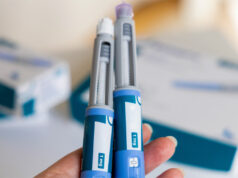 Not enough diabetes patients are getting their recommended kidney health screenings, according to a new study by the US National Kidney Foundation (NKF) and the National Committee for Quality Assurance (NCQA).
Not enough diabetes patients are getting their recommended kidney health screenings, according to a new study by the US National Kidney Foundation (NKF) and the National Committee for Quality Assurance (NCQA).
According to new data published in the journal Mayo Clinic Proceedings: Innovations, Quality & Outcomes, less than 40% of patients with diabetes have been recommended at least annual kidney health screening tests. Additionally, NKF and NCQA found “concerning disparities” in even lower fulfilment of recommended testing among Black/African Americans and socioeconomically disadvantaged groups, a press release states, “underscoring the urgent need to address these disparities to ensure equitable care for all”. NKF, the release states, is therefore “calling on health professionals to prioritise kidney health screening for individuals with diabetes, which is pivotal to ensuring timely diagnosis and equitable treatment of CKD”.
At the heart of addressing this “concerning issue” lies the Kidney Health Evaluation Measure for People with Diabetes (KED), jointly developed by the NKF and NCQA. Operating as a “pivotal component” of the Healthcare Effectiveness Data and Information Set (HEDIS), KED serves as a tool for the Centers for Medicare & Medicaid Services (CMS) to pinpoint areas for improvement and set achievable targets for enhanced care.
The study, a collaborative effort between NKF and NCQA, looked at CKD testing based on KED criteria, examining data from a vast OptumLabs Data Warehouse encompassing over seven million adults with diabetes. This analysis was made possible in part by a grant from the AARP Quality Measure Innovation program. Using claims and electronic health records data, researchers made several key findings. These include the conclusion that fewer than 40% of adults with diabetes received guideline-recommended testing for CKD in 2017 with low urine albumin-creatinine ratio (uACR) testing as the primary limitation.
The authors of the study also found that there was lower KED fulfilment in Black/African Americans and socioeconomically disadvantaged groups (Medicare-Medicaid dually eligible, lower neighbourhood income, lower neighbourhood education status), “demonstrating disparity in lower testing for albuminuria”. KED fulfilment was also associated in the study with improved diabetes care and CKD diagnosis, as well as “evidence-based drug prescriptions” for CKD, blood pressure and blood sugar control; it was further associated with better rates of interdisciplinary care.
“Kidney health testing is pivotal to ensuring timely diagnosis and equitable treatment of CKD,” added Joseph Vassalotti, the NKF’s chief medical officer. “Based on this knowledge, we want healthcare professionals, policymakers, and communities to use KED guidance as an important step in the roadmap to counter the significant public health challenge posed by undetected and untreated CKD.”
In the face of these findings, NKF is urging health care professionals to prioritise CKD testing for individuals with diabetes, as outlined by KED. Approximately 90% of people with CKD in the United States don’t even know they have it, the press release adds.
“Lack of awareness among practitioners of the importance of routine kidney health evaluation in high-risk populations is an obstacle to patient engagement,” added Silvia Ferrè, senior director of patient outcomes research at the NKF. “Timely diagnosis of CKD in people at risk will allow them to receive early support and education. NKF can connect people with CKD to a variety of patient programs, such as the NKF Patient Network, to empower them through education, peer-support, and participation in research.”
“Ultimately,” the release concludes, “professional education about guideline-recommended testing for CKD among people with diabetes should lead to timely and equitable CKD diagnosis and people-centred care.”












